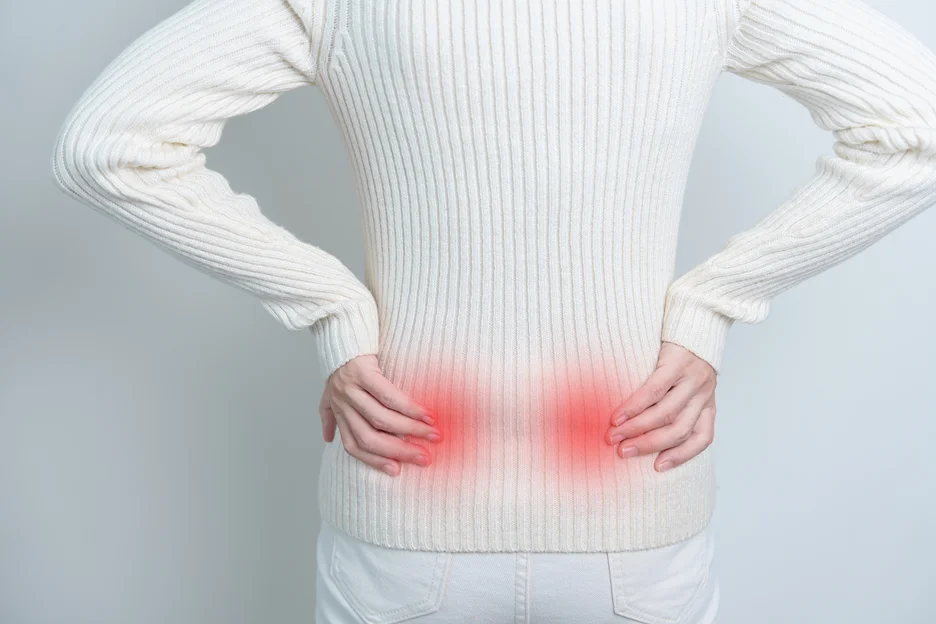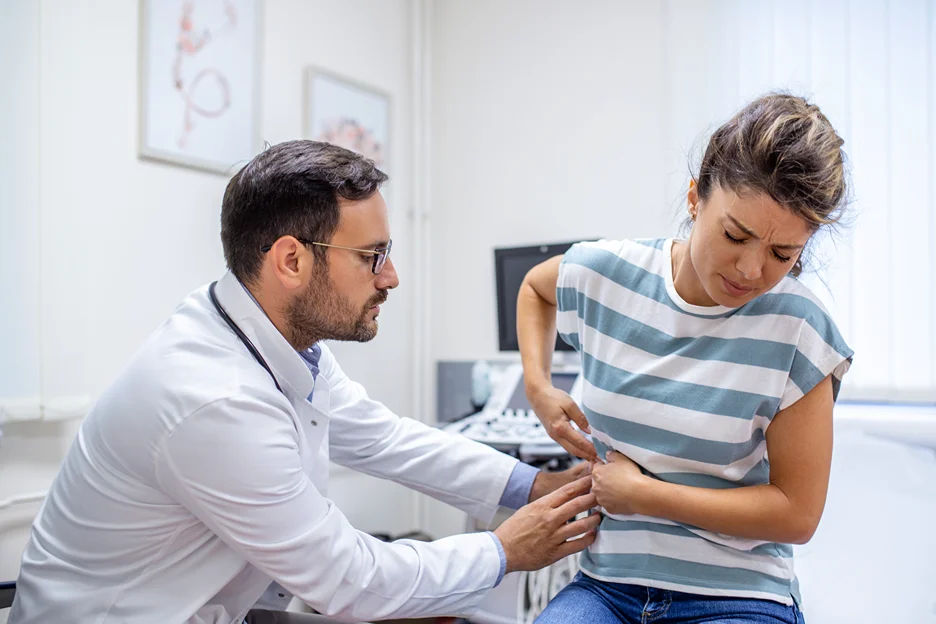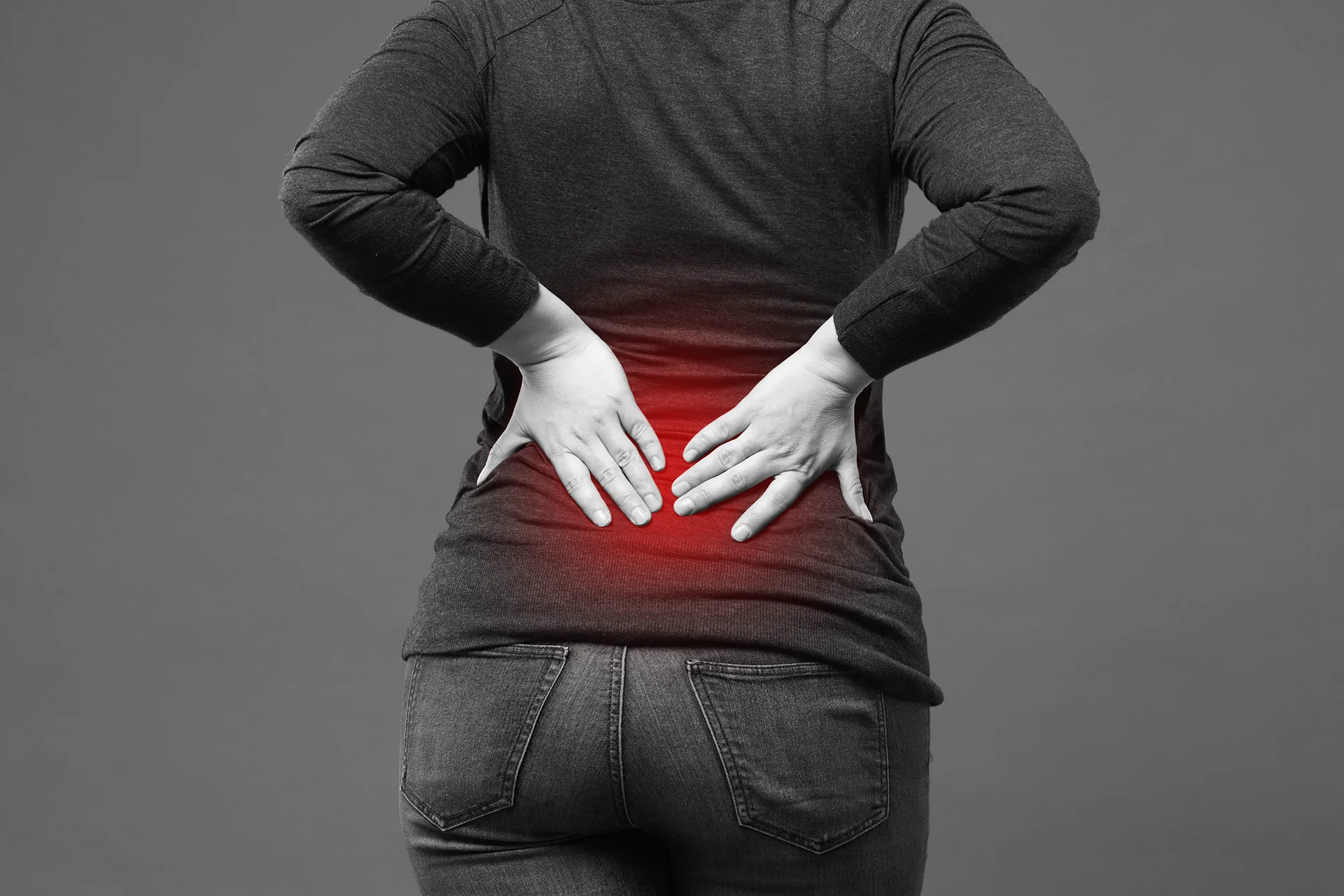If you’re experiencing pain in your back, you may automatically blame strain from exercise, poor posture, or an injury. But you might be surprised to learn that one unexpected culprit could be lurking within – a urinary tract infection (UTI).
Let’s explore the connection between UTIs and back pain so you can get the answers and relief you need if this issue strikes.
What Exactly Is a UTI?
A urinary tract infection (UTI) refers to an infection anywhere along the urinary tract, usually caused by bacteria. It commonly affects the bladder (cystitis) but can spread to the kidneys (pyelonephritis). Symptoms include painful urination, frequent urination, fever, and back pain. Prompt antibiotic treatment is key to avoid complications.
Is Back Pain a Symptom of UTI?
The answer is yes – UTIs absolutely can and do often cause back pain for many patients. A major study reported that a majority of women with UTI also experience back pain.. So while not universal, back pain is definitely a common occurrence with these infections.
Why Does a UTI Cause Back Pain?
There are two primary explanations experts have uncovered to explain the back pain triggered by urinary tract infections:
- Inflammation spreads from the infection site to nearby areas like the kidney and ureters.
- Muscle spasms triggered throughout the body in response to the infection.
In most cases of UTI-related back pain, it’s likely a combination of these two mechanisms working together to make your back ache.
What Does UTI Back Pain Feel Like?

UTIs can cause back pain in many forms, but some specific patterns and characteristics are most frequently reported:
- Low back pain – Pain in the lower back is the most common site, likely because it is closest anatomically to the urinary tract where the infection originates…
- Flank pain – Flank pain refers to discomfort on the sides of the back near the ribs. This is a common sign of kidney involvement, since the kidneys sit tucked up high on either side along the back behind the abdomen…
- Nighttime back pain – Many UTI patients report their back pain is often worse at night or when trying to sleep.
- Muscle spasm sensation – As mentioned earlier, many individuals describe their UTI-related back pain as intense muscle tightness, cramping, and spasms…
- Dull ache – While it can sometimes be severe, the back pain from UTIs also commonly manifests as just a mild dull ache. This can be easy to brush off as normal soreness but may indicate an underlying UTI.
If any of these back pain symptoms sound familiar and you’re also experiencing typical UTI symptoms like burning urination, don’t ignore it. Seek medical treatment promptly for both relief and to avoid complications.
| Location | Description | Possible Cause |
| Lower back | Pain in the low back muscles, often achy or sore | Inflammation near bladder, muscle spasms |
| Flank | Pain in upper sides of the back near ribs | Kidney inflammation due to infection spread |
| Mid back | Aching between shoulders or near bra line | Referred pain from bladder/ureters |
| Upper back | Pain between shoulder blades or at neck base | Spread of kidney infection |
How Long Does UTI Back Pain Last?
The duration of UTI-related back pain varies but often dissipates within 1-2 days of starting treatment for a mild bladder infection. More severe kidney infection and back pain can take 5-7 days to fully resolve after antibiotics. Residual pain may linger for up to 2 weeks before disappearing entirely.
How Can I Relieve Back Pain from a UTI?
While antibiotics will treat the root infection, you’ll also want to look for ways to alleviate the pain itself for some sweet relief.
Here are some methods worth trying:
- Heat therapy – Heat helps relax tense muscles and increase blood flow to ease back pain.
- OTC medication – Over-the-counter NSAID pain relievers like ibuprofen can help reduce inflammation contributing to back pain.
- Rest – Avoid strenuous activity that strains the back while it’s hurting…
- Hydrate – Drink lots of water and fluids.
- Stretching – Gentle stretches for the lower back may provide relief from muscle tightness and spasms.
- Cold therapy – For severe UTI back pain, applying cold packs can numb the area and reduce inflammation.
But remember – don’t try to tough out severe back pain at home without seeing a doctor, as this could allow the UTI to worsen.
When to See a Doctor for Back Pain Caused by UTIs
Mild to moderate back pain from an uncomplicated UTI can often be managed at home while you get treated. But more severe symptoms warrant prompt medical attention. Reach out to your doctor right away if any of the following arise:
- High fever over 101°F
- Back pain that becomes progressively worse, not improving
- Severe pain that interferes with sleep or daily activities
- Neurological symptoms like tingling or numbness
- Signs the kidneys are infected like flank pain or nausea/vomiting
- You recently had a kidney transplant or other urinary tract procedures
- You have diabetes, a weakened immune system, or other medical vulnerabilities
- Standard UTI medications fail to relieve the back pain
- Discomfort persists long after the infection itself seems cured
Don’t delay seeking medical care if your back symptoms are severe or don’t follow the expected timeline.
Though rare, UTIs that reach the kidney can occasionally progress to sepsis – a life-threatening complication requiring emergency treatment. It’s always better to err on the side of caution.
Are Certain People More Prone to Back Pain with UTIs?
While anyone can develop back discomfort from a UTI, certain individuals seem to be more vulnerable. According to a review in Mayo Clinic Proceedings, groups vulnerable to complicated UTIs include women, the elderly, diabetics, those with prior UTIs, kidney problems, or weakened immunity. Risk factors that make you more likely to experience back pain with a urinary tract infection include:
- Women – Due to anatomy, women are 2-3 times more prone to UTIs in general, including complicated kidney infections that provoke back pain.
- Diabetes – High blood sugar creates favorable conditions for UTIs to thrive, potentially causing more severe symptoms like back pain.
- Previous UTIs – Recurrent UTIs can increase back pain likelihood, as each successive infection causes cumulative damage to the urinary tract.
- Kidney problems – Pre-existing kidney dysfunction, stones, or abnormalities boost chances the infection will spread to the kidneys and cause back/flank pain.
- Weakened immunity – Those with poor immunity due to illness or medications are more susceptible to advanced kidney and ureter infections most associated with back pain.
- Older age – Risk for complicated UTIs rises with age, increasing rates of accompanying back discomfort in seniors.
- Spinal abnormalities – Those with back conditions like scoliosis or slipped discs may be predisposed to experience pain in the area when infected.
- Recent urinary tract procedures – Surgeries on the urinary tract can provoke infections more prone to spreading into the back region.
If you fall into any of these high-risk categories, be extra vigilant about monitoring your back if a UTI develops. Report concerning symptoms to your doctor ASAP. Catching and treating the infection early is key to avoiding complications.
Can Proper UTI Prevention Help Avoid Back Pain?
The best solution for UTI back pain is avoiding those pesky infections in the first place whenever possible. Practicing good prevention strategies can help keep the urinary tract healthy and free from bacteria looking to cause mayhem.
Key prevention tips include:
- Stay hydrated – Drink lots of fluids daily to flush out bacteria. Water is best.
- Urinate regularly – Don’t hold it! Use the restroom as needed to empty the bladder before bacteria can grow.
- Proper wiping – Always wipe front-to-back after using the toilet to avoid spreading germs to the urethra.
- Avoid long baths – Taking frequent or long baths can wash away protective oils and allow bacteria intrusion.
- Urinate after sex – Pee ASAP after intercourse to flush out any bacteria introduced.
- Avoid douching/deodorants – These can disturb the urinary tract’s normal bacterial balance.
- Wear cotton underwear – Breathable cotton limits moisture buildup where bacteria can thrive.
- Take probiotics – Probiotic supplements support healthy bacteria levels to crowd out bad bacteria.
- Practice safe sex – Use protection and take care with new partners to prevent exchange of bacteria.
By integrating these simple tips into your everyday routine, you can keep those pesky UTIs and their painful back symptoms away!
Getting Treated for UTI Back Pain

If you’re experiencing pain or discomfort in your lower back, it may be caused by a urinary tract infection (UTI). At Kaly, we understand how uncomfortable UTIs can be. The back pain from a UTI can range from mild soreness to severe discomfort, putting a real damper on your day.
The good news is that with proper diagnosis and treatment from your doctor, UTI back pain can be relieved quickly. Kaly is here to provide information and support while you recover, so you can get back to feeling your best again soon.
At Kaly, we want to help you understand the connection between UTIs and back pain. Our medical experts provide trusted information so you can find the right treatment and get back to your everyday activities. Don’t let UTI back pain slow you down. Reach out today to learn more.
